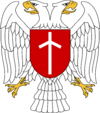Empire of Arciluco
This article is incomplete because it is pending further input from participants, or it is a work-in-progress by one author. Please comment on this article's talk page to share your input, comments and questions. Note: To contribute to this article, you may need to seek help from the author(s) of this page. |
Solarian Empire Imperium Solarium Ⰹⰿⱂⰵⱃⰹⱆⰾ Ⱄⱁⰾⰰⱃⰹⰰⱀ Imperiul Solarian | |||||||||||
|---|---|---|---|---|---|---|---|---|---|---|---|
| 425–1340 | |||||||||||
| Motto: "Ad lucem perseverabimus" "Ⰰⰴ ⰾⱆⱌⰵⰿ ⱂⰵⱃⱄⰵⰲⰵⱃⰰⰱⰹⰿⱆⱄ!" "We will persevere towards the light" | |||||||||||
| Capital | Arciluco | ||||||||||
| Common languages | Amathian Solarian | ||||||||||
| Religion | Episemialism | ||||||||||
| Demonym(s) | Solarian Amathian Arcilucan | ||||||||||
| Government | Mixed, functionally absolute elective caesaropapist monarchy | ||||||||||
| Domnitor | |||||||||||
• 425-470 | Cyriacus the Elder | ||||||||||
• | Eligiu the Holy | ||||||||||
• | Celiu the Amathian | ||||||||||
• 1325-1340 | Cosmin the Reckless | ||||||||||
| History | |||||||||||
• Established | 425 | ||||||||||
• Disestablished | 1340 | ||||||||||
| |||||||||||
| Today part of | Amathia | ||||||||||
| |||||||||||
The Empire of Arcluco, also referred to as the Amathian Empire and Amathia, officially known as the Solarian Empire and symbolically known as the Silver Throne, was a nation in Eastern and Central Euclea during the Middle Ages. Starting as a rump state of the old Solarian Empire in the province of Amathia that survived the collapse and fragmentation of the empire, the territory ruled from the city of Arciluco had to permanently fight for its survival while almost completely surrounded by Marolevic tribes and hostile neighbors. Cut off from the former Solarian homelands and most other big Eastern Euclean states for centuries, the Arcilucan realm developed its own distinct identity and culture, abandoning Classical Solarian as the Vulgar Solarian language of its inhabitants evolved into Proto-Amathian.
As a successor state of the Solarians, surrounded by various barbarian kingdoms and tribes, the territories of Arciluco remained civilized, helping the empire become an important cultural, economic, and military force in its region. The empire's well developed ability to use a combination of force and diplomacy in order to ensure the friendship and loyalty of neighboring barbarian states was crucial for its survival, and for its development as a leading regional power in southern Euclea.
For most of its history, the Arcilucan state was also known symbolically as the Silver Throne, after the ceremonial throne of the Arcilucan emperor, and it was during the empire's existence that Arciluco's reputation as the impregnable White Citadel was created.
Nomenclature and Etimology
The Empire of Arciluco (Solarian: ⰿⱂⰵⱃⰹⱆⰿ Ⰰⱃⱌⰹⰾⱆⱌⰹ, Imperium Arciluci, Amathian: Ⰹⰿⱂⰵⱃⰹⱆⰿ ⰴⰵ Ⰰⱃⱌⰹⰾⱆⱌⱁ, Imperiul de Arciluco) and the Arcilucan Empire (Amathian: Ⰹⰿⱂⰵⱃⰹⱆⰾ Ⰰⱃⱌⰹⰾⱆⱌⰰⱀ Imperiul Arcilucan) are both exonyms, used by most historians in order to make the distinction between Arciluco, the ancient Solarian Empire, and the Verliquois Empire.
The realm was also known by the name of the Solarian province that had formed its core, the province of Amathia (Ⰰⰿⰰⰸⰹⰰ), as the Amathian Empire (Solarian: ⰿⱂⰵⱃⰹⱆⰿ Ⰰⰿⰰⱚⰹⰰⰵ, Imperium Amathiae, Amathian: Ⰹⰿⱂⰵⱃⰹⱆⰾ Ⰰⰿⰰⱚⰹⰰⱀ, Imperiul Amathian). Other rare exonyms are based on the name of the dynasty that created this nation, the House of Cyriacus, which led to the name of the Cyriacan Empire (Solarian: ⰿⱂⰵⱃⰹⱆⰿ Ⱌⱏⰹⱃⰹⰰⱌⱆⰿ, Imperium Cyriacum, Amathian: Ⰹⰿⱂⰵⱃⰹⱆⰾ Ⱌⱏⰹⱃⰹⰰⱌ, Imperiul Cyriac)
As the realm claimed to be the direct continuation of Solaria's hegemony, the nation was officially called and known to its inhabitants as the Solarian Empire (Solarian: Ⰹⰿⱂⰵⱃⰹⱆⰿ Ⱄⱁⰾⰰⱃⰹⱆⰿ, Imperium Solarium, Amathian: Ⰹⰿⱂⰵⱃⰹⱆⰾ Ⱄⱁⰾⰰⱃⰹⰰⱀ, Imperiul Solarian), the Kingdom of the Solarians (Solarian: ⱃⰅⰃⰐⰖⰏ ⱄⰑⰎⰀⰓⰉⰀⰐⰑⰓⰖⰏ, Regnum Solarianorum), Amathian: Ⱃⰵⰳⰰⱅⱆⰾ Ⱄⱁⰾⰰⱃⰹⰵⱀⰹⰾⱁⱃ, Regatul Solarienilor the Empire of the Solarians (Solarian: ⰿⱂⰵⱃⰹⱆⰿ Ⱄⱁⰾⰰⱃⰹⰰⱀⱁⱃⱆⰿ/, 'Imperium Solarianorum, Amathian: Ⰹⰿⱂⰵⱃⰹⱆⰾ Ⱄⱁⰾⰰⱃⰹⰵⱀⰹⰾⱁⱃ, Imperiul Solarienilor) and the Solarian Republic (Solarian: Ⱃⰵⱄ Ⱂⱆⰱⰾⰹⱌⰰ Ⱄⱁⰾⰰⱃⰹⰰⱀⰰ, Res Publica Solariana, Amathian: Ⱃⰵⱂⱆⰱⰾⰹⱌⰰ Ⱄⱁⰾⰰⱃⰹⰰⱀⱐ, Republica Solariană ). The inhabitants continued to call themselves Solarians (Ⱄⱁⰾⰰⱃⰹ,Solari) and Amathians (Ⰰⰿⰰⱚⰹ/Amathi), with the second term only gaining prevalence in the last part of the realm's existence.
Symbolically and ceremonially, the empire was also known as the Silver Throne (Solarian: Ⱄⱁⰾⰹⱆⰿ Ⰰⱃⰳⰵⱀⱅⰵⱆⰿ, Solium Argenteum, Amathian: Ⱄⱁⰾⰹⱆⰾ ⰴⰵ Ⰰⱃⰳⰹⱀⱅ, Soliul de Argint).
The use of the Solarian alphabet slowly faded away in official uses, due to its perceived pagan origins which slowly made the Ecumenical Patriarchate of Arciluco mandate an official switch to the Apsinthian alphabet in the later half of the 9th century. In court, the Solarian alphabet was never truly abandoned but it was replaced in the minting of coins and in most of its uses following the enmity between Arciluco and the Catholic states of Eastern Euclea.

